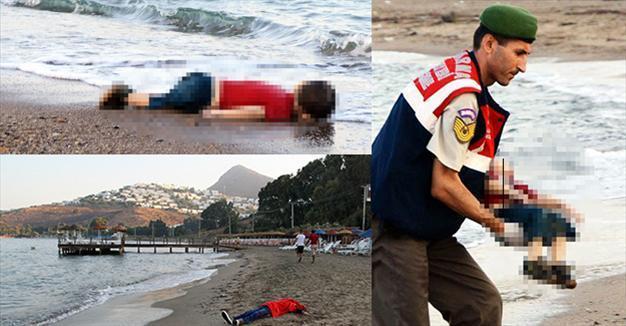12 migrants drown heading from Turkey to Greek island
ISTANBUL

Turkish security forces patrolled the shores of Muğla, finding the bodies of several refugees, including a child, who drowned and were washed ashore. DHA photos
At least 12 migrants believed to be Syrians drowned as two boats sank after leaving southwest Turkey for the Greek island of Kos, Doğan News Agency reported on Sept. 2.It said a boat carrying 16 Syrian migrants had sunk after leaving the Akyarlar area of the Bodrum peninsula, and seven people had died. Nine people were rescued and the coastguard was continuing its search for two people still missing.
Separately, a boat carrying six Syrians sank after leaving Akyarlar on the same route. Three children and one woman drowned and two people survived after reaching the shore in life jackets.
Aid agencies estimate that, over the past month, about 2,000 people a day have been making the short crossing to Greece's eastern islands on rubber dinghies.
The Turkish government said on Tuesday that the coastguard rescued over 42,000 migrants in the Aegean Sea since the beginning of 2015 and more than 2,160 in the last week alone.
Migrants, many of whom have paid over $1,000 to smugglers for the risky passage,
are taking advantage of the calm summer weather which makes this the best time for the crossing.
A ship bringing about 1,800 migrants and refugees from one of the islands arrived at the port of Piraeus near Athens on Tuesday night, the Greek coastguard said.
EU outlines new plans as crisis worsens
Turkey hosts more than 1.9 million Syrian refugees. In the European Union, only Germany and Sweden host more than 10,000 Syrian refugees, with other EU countries hosting only hundreds or fewer.
The EU executive will outline new plans next week to share out refugees across European states as well as to speed deportations of unwanted migrants, the 28-nation bloc's migration commissioner said on Sept. 1.
Dimitris Avramopoulos told Reuters that new EU systems for processing asylum claims in Italy, Greece and possibly Hungary could involve detaining those rejected until they return home, as European governments strain to balance obligations to provide refuge with hostility among the public to mass immigration.
















